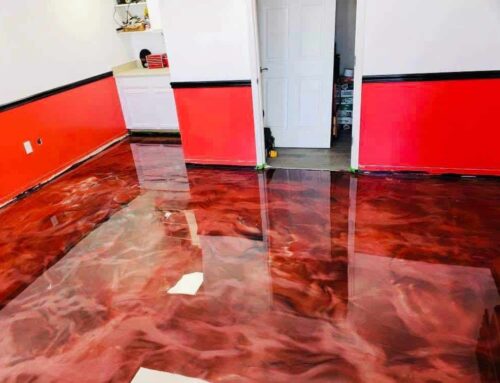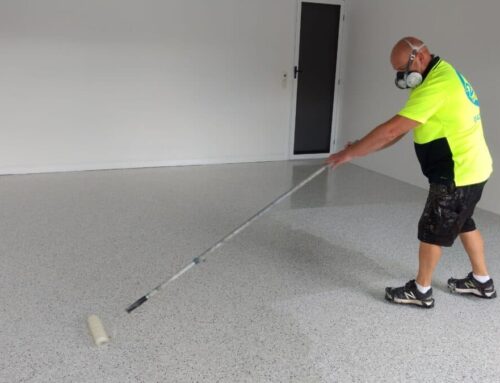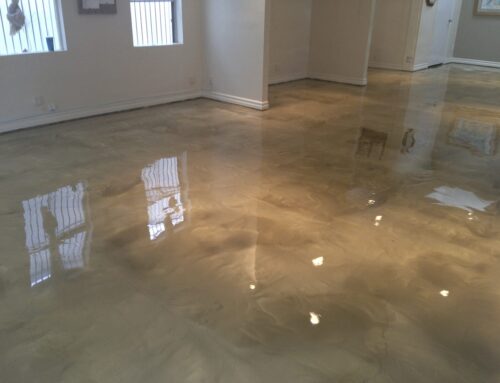Create a durable surface resistant to heavy traffic with epoxy flooring. Enjoy benefits like cost-effective durability and minimal maintenance needs. Consider resin, metallic, or quartz coatings for diverse design options. Adequate surface prep, cleaning, and application ensure quality installation. Regular maintenance with gentle cleaners and caution with furniture prevent damage. While DIY kits offer upfront savings, professional installation guarantees expertise and long-lasting results. Professionals provide efficient and flawless finishes, enhancing your space effortlessly. Dive deeper into the ultimate guide for expert tips and insights to perfect your epoxy flooring.
Benefits of Epoxy Flooring
Epoxy flooring offers a myriad of benefits that make it a popular choice for both residential and commercial spaces. One of the key advantages of epoxy flooring is its cost-effective durability. The initial investment in epoxy flooring may be slightly higher than traditional flooring options, but its long-term durability far outweighs the upfront cost. Epoxy floors are incredibly resilient to heavy foot traffic, impact, and chemicals, making them a cost-effective choice in the long run due to their minimal maintenance requirements and extended lifespan.
Moreover, epoxy flooring provides exceptional aesthetic versatility. Whether you are looking for a sleek, modern finish for a commercial space or a vibrant, decorative option for a residential garage, epoxy flooring can be customized to suit your style preferences. With a wide range of colors, patterns, and finishes available, epoxy flooring allows you to create a unique look that enhances the overall aesthetic of your space. Additionally, epoxy coatings can be applied with various textures, such as metallic or flake additives, adding depth and dimension to the flooring surface.
Different Types of Epoxy Coatings
When it comes to epoxy coatings, understanding the different types available is crucial. Common epoxy types, specialty coatings, and various applications and finishes play a significant role in determining the best option for your specific needs. By exploring these distinctions, you can make informed decisions to achieve the desired results for your flooring projects.
Common Epoxy Types
Exploring the array of common epoxy types available can help you determine the most suitable coating for your specific needs and requirements. Epoxy resin is a popular choice for its durability and versatility, offering various flooring options such as metallic, quartz, and flake systems. Epoxy paint, another common type, provides a cost-effective solution for enhancing the appearance of concrete surfaces while adding a protective layer. To maintain epoxy flooring, regular cleaning with a soft-bristle broom or mop using a mild detergent is recommended. Avoid harsh chemicals that can damage the epoxy surface and opt for gentle cleaners to preserve the coating’s integrity. Understanding these common epoxy types empowers you to make informed decisions when selecting the ideal coating for your space.
Specialty Epoxy Coatings
To delve into the realm of specialty epoxy coatings, understanding the unique characteristics and applications of these specialized products is essential for making informed choices tailored to your specific flooring needs. Specialty epoxy coatings offer a wide range of decorative options, allowing you to customize your floors with various patterns, textures, and designs. These coatings also provide the flexibility of choosing custom colors to match your aesthetic preferences or branding requirements. Whether you’re looking to enhance the visual appeal of your space or create a unique flooring design, specialty epoxy coatings can help you achieve your desired look. With their versatility and durability, these coatings are a popular choice for both residential and commercial settings seeking a blend of functionality and style.
Applications and Finishes
For a comprehensive understanding of epoxy flooring, it is essential to explore the diverse applications and finishes available through different types of epoxy coatings. When considering design options, epoxy coatings offer a wide range of colors, patterns, and textures to suit various aesthetics and functional needs. The durability of epoxy coatings is unmatched, providing a long-lasting solution for high-traffic areas or industrial settings. In terms of cost considerations, epoxy flooring can be a cost-effective choice compared to traditional flooring options due to its longevity and minimal maintenance requirements. Speaking of maintenance, epoxy floors are easy to clean and maintain, requiring simple care routines to keep them looking pristine for years to come.
Epoxy Flooring Installation Process
When installing epoxy flooring, you will need to pay close attention to the surface preparation steps to ensure a successful application. Understanding the application techniques is crucial for achieving a smooth and durable epoxy finish. Proper execution of these steps will result in a high-quality epoxy flooring installation.
Surface Preparation Steps
Properly preparing the surface is essential for ensuring a successful epoxy flooring installation. Begin by thoroughly cleaning the concrete surface to remove any dirt, grease, or other contaminants. Conduct a moisture test to ensure the concrete is dry enough for the epoxy application. Next, inspect for cracks and repair them using an appropriate filler to prevent them from affecting the epoxy’s performance. Acid etching is then used to create a rough surface that promotes better adhesion of the epoxy coating. This step involves applying an acid solution to the concrete, allowing it to sit for a specified time, and then thoroughly rinsing it off. Following these surface preparation steps diligently will help guarantee a durable and long-lasting epoxy flooring finish.
Application Techniques
To ensure a successful epoxy flooring installation, it is important to master the precise application techniques that will determine the quality and longevity of the finished surface. Proper curing is crucial in this process; it involves allowing the epoxy to dry and harden completely to achieve maximum durability. When applying the epoxy, ensure the area is well-ventilated and follow the manufacturer’s instructions regarding mixing ratios and application methods. After the epoxy base coat has been applied and has properly cured, considering topcoat options is essential to enhance the floor’s appearance and provide additional protection. Topcoat options can include clear coats for a glossy finish or non-slip additives for improved safety. Selecting the right topcoat will also contribute to the overall resilience and longevity of your epoxy flooring.
Tips for Maintaining Epoxy Floors
Maintaining epoxy floors requires consistent cleaning and periodic resealing to preserve their durability and aesthetic appeal. To ensure the longevity of your epoxy flooring, it is essential to implement proper cleaning methods and take precautions to prevent scratches and spills.
Regularly sweeping or vacuuming your epoxy floors helps prevent dirt and debris from scratching the surface. For a more thorough clean, mopping with a gentle cleaner diluted in warm water is recommended. Avoid using harsh chemicals or abrasive cleaners as they can damage the epoxy finish. Additionally, using a soft-bristled brush can help tackle stubborn stains without causing harm to the flooring.
To prevent scratches on your epoxy floors, consider placing felt pads under furniture legs to avoid friction when moving items. High heels and sharp objects can also cause scratches, so it’s advisable to take off shoes at the door and handle heavy items with care. In areas prone to spills, such as kitchens or garages, promptly clean up any spills to prevent staining or damage to the epoxy coating.
DIY Vs. Professional Epoxy Flooring
When considering epoxy flooring for your space, weighing the pros and cons of DIY installation versus hiring a professional is crucial for achieving the desired results. Let’s delve into the key factors to consider:
Cost Comparison: DIY epoxy flooring kits are generally cheaper upfront compared to hiring a professional installer. However, keep in mind that mistakes during the DIY process can end up costing more in repairs or reapplication. Professionals may have access to higher-quality materials at better prices due to industry connections.
Durability Assessment: Professional epoxy flooring installations often come with warranties, ensuring the durability of the floor. While some experienced DIYers can achieve similar results, professionals bring expertise that guarantees a longer-lasting finish.
Time Commitment: DIY epoxy flooring requires meticulous preparation, application, and curing time. If you have a busy schedule or lack experience, the project may take longer than anticipated. Professionals can complete the job efficiently, minimizing disruptions to your routine.
Skill Level: Epoxy flooring application demands a certain level of skill to ensure a flawless finish. Professionals have the expertise to handle challenges like temperature control, surface preparation, and achieving a smooth coat. If you’re not confident in your abilities, hiring a professional is the safer choice.
Consider your budget, timeline, and skill level when deciding between a DIY epoxy flooring project and hiring a professional.
Enhancing Your Space With Epoxy
Enhance the appeal and functionality of your space by incorporating epoxy flooring solutions that elevate both aesthetics and durability. Epoxy flooring offers a myriad of creative designs and color options to suit any style or preference, making it a versatile choice for enhancing various spaces.
When considering how to enhance your space with epoxy, creative designs play a significant role. From metallic finishes that add a modern touch to 3D effects that create visual interest, epoxy allows you to customize your floors to reflect your unique personality and elevate the overall look of your space. Whether you prefer a minimalist, industrial, or even a high-gloss finish, epoxy can be tailored to match your vision.
Moreover, color options are another key element in transforming your space with epoxy flooring. With a wide range of colors available, you can choose hues that complement your existing decor or make a bold statement. Whether you opt for a single color or a blend of colors to create a marbled effect, epoxy provides endless possibilities for enhancing the ambiance of any room.






